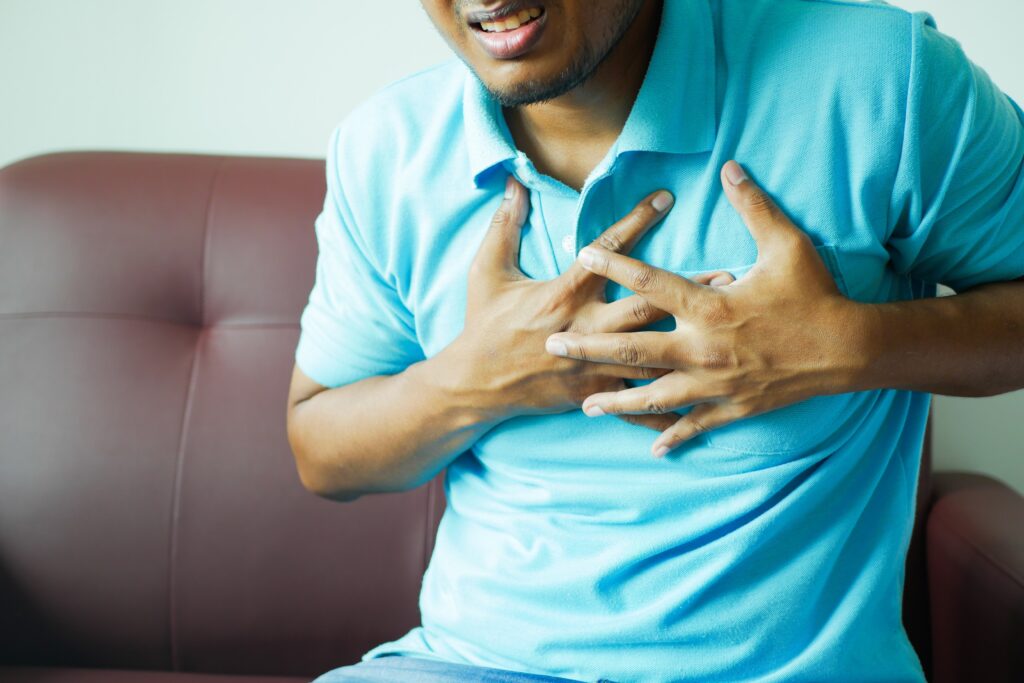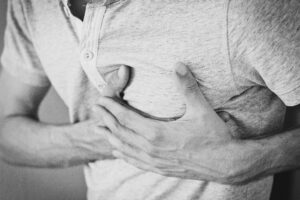What to know about making a claim for chest pain from a car accident?
Getting into a car accident can be a traumatic experience, and unfortunately for some people the physical repercussions of an accident don't end when the car stops. Chest pain after a car accident is one possible outcome that many people may not expect but which should be taken seriously.
This type of chest pain can range from mild to severe and can have serious implications if it isn't treated properly. It could indicate anything from minor muscular strain to more serious conditions such as heart damage or internal bleeding in the lungs or abdomen. Knowing what symptoms to look out for and how to respond appropriately are important steps in protecting yourself after an auto collision. Also, contacting a car accident lawyer can help make sure your rights are protected.

Why is chest pain so common after a car accident?
Chest pain after a car accident is a relatively common occurrence, but it's important to understand why this type of pain develops and the possible causes. When the accident causes someone to hit the steering wheel, the chest injuries sustained can be devastating. Even if you do not feel chest pain immediately, consider seeing a doctor immediately. If you experience severe pain, it is a good idea to seek medical treatment immediately to get an accurate diagnosis.
One of the primary reasons why chest pain may occur after an auto collision is due to force from the impact itself. When two objects collide at great speed, as in a car crash, tremendous pressure can be created which could cause injuries directly related to the chest area hitting the steering wheel including bruises or abrasions to internal organs. In addition, these same forces can create muscular strain or sprain that leads to varying levels of discomfort.

Beyond direct trauma there are other issues that could arise during or following an accident which might result in a chest injury. The sudden jerking motion caused by accidents can lead to dislocation or separation of parts within the rib cage; breathing problems like pulmonary contusions might also develop due to blunt force striking against lungs and diaphragm muscles; whiplash-like conditions such as rotational injuries – where one part of body moves faster than others – are also frequent sources for intense chest pains; lastly, even seemingly minor issues such as hyperventilation could create symptoms similar those mentioned above and should not be discounted if serious injury has been ruled out by medical professionals.
Seatbelts can cause a chest injury
The seatbelt is one of the most important safety measures in a car, but it can also be a source of a chest injury after an accident. Seatbelts are designed to keep occupants safe by restraining them during sudden stops and impacts, however this same force can cause a severe chest injury such as broken ribs if used improperly or during particularly intense collisions.
The blunt force trauma from the belt across the chest area could result in a chest injury such as bruising, fractured sternum or muscular strain, as well as other issues such as rib fractures or organ damage. Damage can also be done to chest muscles, upper body, cardiac contusions, a fractured sternum, and a chest cavity injury.
Additionally, whiplash-like conditions in car accidents such as rotational injuries may occur due to the rapid acceleration and deceleration associated with seatbelt use. It's important for individuals who experience chest pain after an auto collision to get checked out by medical professionals in order to rule out more serious injuries that might have been caused by their seatbelt use.
How can I treat chest pain from a car accident?
The first step in treating a chest injury after a car accident is to seek medical attention. Physicians can evaluate the extent of the injury and create a tailored treatment regimen for each individual. This can include anything from rest, to physical therapy, to medications. Depending on the severity of the injury, some people may be prescribed stronger painkillers (e.g., opioids) or anti-inflammatories (e.g., ibuprofen) to help reduce discomfort and swelling in the affected area.

Reduce inflammation
The primary goal for treating chest pain after a car accident should be to reduce inflammation and promote healing of any underlying injury. To this end, there are several different approaches that can be taken. One way is through physical therapy exercises such as stretching, strengthening, range-of-motion activities, and postural control training. These exercises can help prevent further damage and aid recovery by gradually increasing mobility while minimizing pain levels. Additionally, icing and heat applications can provide additional relief as they work to relax muscles around the injured area while providing temporary analgesia.
Lifestyle changes
In addition to physical therapy and medication management, lifestyle changes may also be recommended by physicians depending on the severity of an individual's chest injuries. People who experience chest pain after a car accident should avoid activities that could aggravate their condition such as lifting heavy items or engaging in strenuous exercise until they have recovered sufficiently enough to do so safely. For instance, with broken ribs, you will likely be unable to continue the same activities. Additionally, relaxation techniques such as deep breathing exercises or yoga can be beneficial for easing tension in affected muscles in chest injuries which may further reduce overall discomfort levels over time.
Psychological help

Finally, psychological interventions may help those who have suffered chest injuries after a car accident cope with any mental health issues stemming from their trauma more effectively.
Talk therapies such as cognitive behavioral therapy (CBT), eye movement desensitization reprocessing (EMDR), or even hypnotherapy have proven effective at helping individuals process their emotions related to traumatic events which could potentially lead to reducing their chronic chest injuries over time. Ultimately, it is important for patients to discuss available treatments options with their doctor in order to find what works best for them individually and help them manage their symptoms going forward into the future.
What to do to start your chest pain injury case after a car accident
If you have chest pain from a car accident, follow these steps:
1. Get examined by a doctor or physician immediately. The first step is to seek medical treatment and get an accurate diagnosis and treatment plan for chest injuries. This includes getting all of the needed diagnostic tests, such as X-rays, CT scans, and MRIs, as well as documenting all of the injuries sustained from the car crash. Once this is done, consider requesting a referral based upon the results of your diagnostic testing.

2. Collect evidence from the car accident to prove fault. Collecting evidence from the car accident to prove fault is an essential part of filing a claim for damages or personal injury resulting from a car accident. This includes gathering any documentation such as police reports, photographs from the scene, and witness statements. Additionally, collecting information about the other parties involved in the accident can be helpful when it comes to determining liability.
This can include:
Insurance information
Driver's license numbers
Contact information for any passengers who may have been in the vehicle with them at the time of the crash.
In addition to these tangible pieces of evidence, it can also be useful to record as many details about the incident as possible that could help determine fault. For example, this could include recalling weather conditions at the time of the accident or if either driver was distracted (e.g., texting while driving) or impaired (e.g., by alcohol).
3. Get a copy of the police report. In order to obtain a copy of the police report after having chest pain from a car accident, you should contact the local law enforcement agency that responded to the scene and request it. When making the report, it is important to provide as much detail as possible regarding the time and location of the incident, as well as any identifying information such as license plate numbers or vehicle descriptions. Depending on the jurisdiction, an administrative fee may be required in order to obtain a copy of the report. Having this report is essential to providing evidence of fault when filing a claim for damages and other monetary compensation related to your injuries.
4. Seek follow up treatment for your chest pain injury. Following up with a medical professional for chest pain after a car accident is essential for ensuring proper treatment and recovery. Seeking follow up care allows an individual to be monitored by a physician for any potential complications that may arise, as well as ensure that any medications prescribed are working effectively. Severe pain caused by a severe chest injury can be debilitating. Follow up treatment can also provide opportunities for car accident victims to discuss the mental health implications of being involved in a traumatic event.

This includes dealing with anxiety or depression, which can often accompany physical trauma. Additionally, follow up care gives individuals the opportunity to explore other alternative treatments such as:
Massage therapy
Acupuncture
Chiropractic care to help alleviate muscle tension from the accident-related injuries.
Ultimately, follow up treatment is vital for minimizing long-term effects of car accident related chest pain and helping patients achieve their best possible outcome following their traumatic experience. It is critical that you seek medical attention if you believe there is an issue.
5. Do not talk with the insurance company about your chest pain or treatment. One key piece of advice when dealing with insurance companies following a car crash is not to discuss your chest pain or treatment without first consulting an attorney. Insurance adjusters may try to pressure you into providing information that could be used against you in court or limit the amount of compensation they are willing to provide for your injuries. With severe chest injuries, you may feel it necessary to immediately give information about how you feel chest pain, or fear an injury to your internal organs. Therefore, it is essential that any conversations about chest pain or treatment related expenses should only occur after speaking with a qualified lawyer who can advise you on how best handle these matters.
6. Keep a journal about your chest pain and how it is impacting your life. A car accident can be a traumatic experience, and the physical and emotional pain that follows can linger for days or even weeks. One way to help manage this pain is by keeping a daily journal about your chest pain after the accident and how it is impacting your life. A blunt force trauma event can cause severe physiological distress.
Writing down your thoughts and feelings on a regular basis can provide insight into anyIt is important to keep a journal of your chest pain and how it impacts your life after you have been involved in a car accident. Keeping a daily record of the physical and emotional experiences associated with the chest pain can help provide insight into what treatments are most helpful for recovery, as well as give an accurate picture of any long-term effects that may arise from the injury.
Additionally, having this written documentation can also be beneficial if legal action needs to be taken against those responsible for causing the accident. Writing down details such as severity of pain, treatment methods used, activities avoided due to discomfort or fear, and other notes about physical symptoms will provide invaluable information when seeking compensation for damages caused by another's negligence or recklessness on the road. By keeping track of these details over time—and consulting with medical professionals throughout—you can ensure that you receive fair compensation for any injuries suffered in an automobile accident.
7. Inform your employer if chest pain is causing issues at your job. After a car accident, it is important that anyone who is experiencing chest pain inform their employer if the pain is causing them issues while at work. Not only can chest pain disrupt an individual's daily activities, but it can also impact their overall job performance. Therefore, contacting your employer and informing them of any chest-related issues as soon as possible is essential to ensuring that you receive the necessary accommodations to address the issue.
This could include implementing a modified work schedule or taking a leave of absence for medical treatment. Additionally, if legal action needs to be taken against those responsible for causing the accident, having an accurate record of when and how your chest pain began affecting your ability to perform at work is invaluable in helping to ensure that fair compensation is received for any damages suffered due to another's negligence or recklessness on the road.
8. Hire a car accident lawyer to seek compensation for your chest pain after a car accident. Hiring a car accident lawyer is one of the best ways to seek financial compensation for any chest pain suffered in an automobile accident. A qualified lawyer can help build a strong personal injury claim against any liable party and ensure that you receive fair and just compensation for your injuries. They will be able to assess all of the details related to the accident, negotiate with insurance companies, and represent you in court if necessary. Moreover, a skilled car accident lawyer can review any medical records associated with your chest pain and offer guidance on what specific treatments may be beneficial for recovery. Ultimately, having legal representation can provide peace of mind knowing that someone is looking out for your best interests and helping to ensure that you receive adequate compensation.
How much compensation can I get for my chest injuries after a car accident?
The amount of compensation an individual can receive for chest pain after a car accident depends largely on the severity and duration of their pain. If the pain is temporary and relatively minor, then the legal system may award only minimal financial damages. However, if the pain is severe and chronic—lasting days, weeks, months, or even years—then the individual may be eligible to receive a much larger sum in compensation.
Compensation is often awarded in order to cover medical bills related to treating the injury as well as lost wages due to missed work. Additionally, some courts may also consider non-economic losses such as emotional distress and loss of enjoyment of life when assigning an appropriate amount of compensation after an automobile accident.

When seeking out compensation for a chest injury after a car accident, it is essential that you have strong evidence backing up your claim. This includes any medical records detailing your injury history and treatment, documentation from your doctor describing the degree of impairment caused by your injury, and a detailed account from yourself about how exactly you were affected emotionally or physically over time. Having this information readily available can help support your case and ensure that you receive fair compensation.
Can I sue for my chest pain injury after a car accident?
Yes, you may be able to sue for your chest pain injury after a car accident. In fact, filing a lawsuit is often the best way to ensure that those responsible for causing your injury are held accountable and that you receive fair compensation for any damages suffered due to their negligence or recklessness on the road. Depending on the severity of your injury, you may be eligible to receive financial compensation related to medical bills associated with treating your chest pain as well as lost wages due to missed work days. Additionally, you may be able to receive damages for non-economic losses.
How to diagnose chest pains from a car accident?
Diagnosing chest pains resulting from a car accident can be a complex process. In general, medical professionals will perform a physical examination that includes assessing the patient's complaints of pain and any visible signs of trauma. They may also order imaging tests such as X-rays or CT scans to determine if there are any fractures in the rib cage or nearby internal organ injuries. Chest injury symptoms may show other issues such as a punctured lung. Other potential examinations include:

An echocardiogram to assess the heart
An electrocardiogram to monitor heart rhythms
A stress test to evaluate how well the patient's body can withstand normal activities
In addition to these tests, doctors may recommend follow-up visits several weeks after the accident for checkups and further evaluation. If chest pain persists after the car accident, then further medical attention is likely necessary. Additionally, patients should be aware of any other symptoms they experience during this time, such as:
Shortness of breath
Broken ribs
Punctured lung
Dizziness
Nausea
Headaches
Fatigue
These may indicate more serious underlying conditions that require medical attention.
How does chest pain interfere with my life?
Chest pain resulting from a car accident can have far-reaching consequences that extend beyond physical discomfort. The pain itself can be debilitating, making it difficult to complete even the most basic of tasks. But the effects of chest pain don't stop there—the injury can also interfere with an individual's ability to work, socialize, and perform everyday activities. In severe cases, chest pain may limit mobility and cause difficulty sleeping or breathing properly.

This can lead to exhaustion or depression, further limiting an individual's quality of life and overall wellbeing. Additionally, ongoing chest pain may also require medical attention which could lead to expensive bills that add additional financial strain on top of everything else. Therefore it is important for those affected by a car accident related chest injury to seek out appropriate legal counsel in order to ensure they receive fair compensation for their suffering.
How to make a claim for chest pain from a car accident?
Your claim for chest pain from the car accident will often start with filing a bodily injury claim with the insurance company. It is recommended to speak with a car accident lawyer before trying to start your insurance claim. When filing for compensation for chest pain after an automobile accident, you will likely need to provide details about the extent of your physical and emotional pain as well as any economic losses associated with the injury.
This includes documentation from doctors regarding your medical prognosis and any missed work due to recovery time. Additionally, you may also have to prove that you did not contribute to causing the accident in any way—for instance if a third party driver was involved who was negligent or reckless on the road—in order for your claim to be successful.
Contact Fletcher Law if you have chest pain from a car accident
If you have experienced chest pain and other physical or emotional trauma due to a car accident, then the attorneys at Fletcher Law can help. Our team is uniquely suited to handle such complex cases, as we offer personalized representation from a team of experienced litigators. Our lawyers will take the time to understand your individual situation and tailor our approach accordingly.

At Fletcher Law, we recognize that chest pain resulting from an auto accident is a serious injury that can significantly disrupt one's life. We strive to provide comprehensive support for those affected by such incidents, with a focus on recovering compensation in order to cover damages associated with medical bills related to treating the chest pain, lost wages due to missed work days, and non-economic losses.
Our legal team is prepared to help you gather evidence that proves the negligence of third parties involved in the incident, as well as document any financial losses or physical discomfort caused by the accident. Hire an experienced attorney to help you. We can also assist you in filing an insurance claim for bodily injury so that you receive fair compensation for your suffering.